Dietary Fiber And Prebiotics – Key Step For Optimal Health
Our gut has millions of bacteria, viruses, fungi, and many other micro-organisms, collectively known as the microbiome. Some bacteria are pathogenic or harmful, and some are beneficial or good or friendly bacteria. The micro-organism present in our intestine needs food to survive. Dietary fibres and Prebiotics are the food that is likely to keep healthy bacteria around.
World Health Organization (WHO) recommends that each adult should include 400 gm fruits and vegetables in their diet every day.
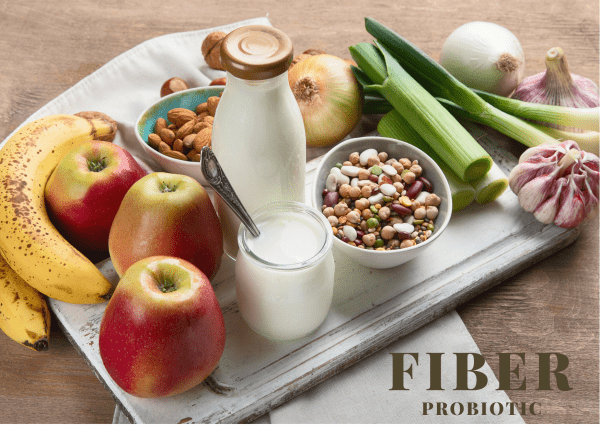
What is Microbiome
- Food such as Dietary Fiber and Prebiotics has a considerable effect on the gut microbiome.
- The human gastrointestinal tract contains millions of micro-organisms, collectively called the microbiome.
- It is vital to have a functional and natural diversity of micro-organisms to have a healthy gut.
- The Gut microbiome plays a significant role in our overall well-being.
- Whole grain food, various fruits, and vegetables help add many good bacteria to the gut.
- Diet is considered a critical factor that can majorly influence the gut microbiota.
Role Of Good Microbiome In Human Health
- The microbiota of the gut helps to build resistance against diseases.
- Synthesize necessary nutrients, which are essential for health.
- Helps in the synthesis of vitamin K2 for bone health.
- Creates short-chain fatty acids as a byproduct that promotes digestive health.
Effect of Diet On the Gut Microbiome
- Recent research suggests that bacteria that present in our gut eat fibers.
- If the gut microbes are deprived of fibers, they start eating the mucus lining of the intestinal tract.
- Therefore, good gut health needs to nourish your microbes well.
- An excellent healthy food choice that allows the intestinal microorganism to grow will naturally achieve optimal health.
- Recent studies show that Fiber and Prebiotics play a significant impact on the microbiome.
Impact Of Fiber, Prebiotic and Probiotics On The Gut Health
- Carbohydrate (Polysaccharide) diet, feeds healthy gut microbiota.
- All fibers are polysaccharides.
- Lower fiber intake decreases the count of good colic bacteria and can cause dysbiosis.
- It has been seen that 4 weeks of a fiber-rich diet can positively change healthy gut bacteria composition.
Classification Of Fiber
Fibers are classified into five main groups. They include-
- 1.Dietary Fiber
- 2.Fermentable Fiber
- 3.Functional Fiber
- 4.Insoluble Fiber
- 5.Soluble Fiber
What Is Dietary Fiber
- Fibers are carbohydrate polymers or polysaccharides such as cellulose, hemicellulose, pectin, gums, etc.
- These polysaccharides cannot be digested or absorbed by the human digestive enzyme.
- Some polysaccharides can be digested by the bacteria present in the gastrointestinal tract.
- Plants have many fibers, so a rich plant-based diet provides the different types of fiber need for the human body.
- There are two major classes of fibers Soluble and Insoluble fiber. Soluble fiber is most important food to feed our microbiome while Insoluble fiber works like roughage.
Sources Of Fiber
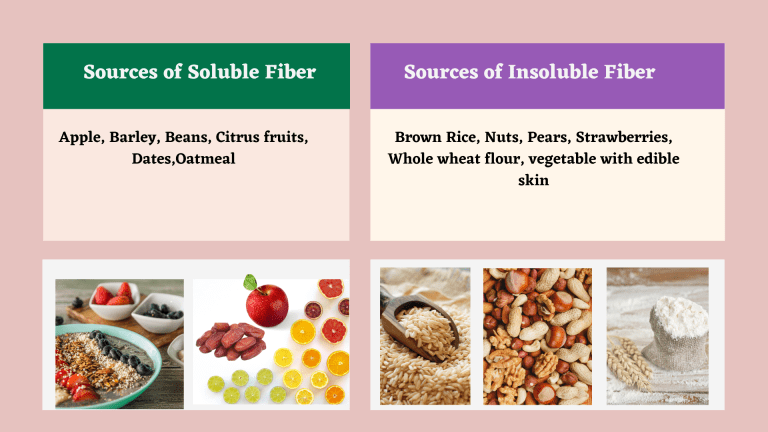
Sources: Soluble And Insoluble Fiber
Health Benefits Of Fiber
Short-Chain Fatty Acid- SCFA is an important energy source for the intestinal mucosal lining. SCFA is produced from the fermentation of the MACs (microbiota-accessible carbohydrates) fiber by the beneficial bacteria in the gut. SCFA in the body mostly include-
- Acetate- is a major SCFA present in the colon, that supports cholesterol synthesis. Acetate is present in vinegar, fermented food and dietary supplements.
- Butyrate– has antiinflammatory and anticancer property. Butyrate is a main source of energy for the intestinal mucosa, and naturally present in dairy products like butter, cream.
- Propionate–helps in producing glucose in the liver, and present in fermented food, cheese and dietary fibers.
- Heart Health- Fiber-rich diet reduces the bad LDL cholesterol and reduces the risk of heart disease by 9% as fiber helps maintain blood pressure in the normal range.
- Diabetes- High fiber diet controls blood sugar levels and lowers the risk of diabetes.
- Weight- Eating fibers help you to lose weight.
- Gut Health- A diet with high fiber promotes good bacteria and helps make a healthy balance of the microbiome necessary for optimal health.
- Skin- Fiber intake supports healthy skin.
- Healthy Bowl- High fiber diet encourages a healthy bowel movement.
- Reduces gas and bloating problem.
How To Include Recommended Fiber In Daily Food Intake
- It is easy to include enough recommended fiber in our daily food.
- Consider high fiber food which contains more than 5 gm fiber in each serving.
- Try to include 15-18 grams of total fiber in each meal and total of 40-45 grams per day.
- People who cannot tolerate fiber can increase slowly and gradually like 3-5 grams per meal.
- If you fall short of meeting your daily intake, have any good fiber supplement.
An integrated approach to Include More Variety Of Fiber In the Diet
A simple modification in diet can quickly increase the consumption of Dietary fibers.
- Add variety of soluble and prebiotic fiber to your daily diet.
- Go slow and gradual if you can’t tolerate fiber.
- Increase raw vegetables and salad to your meal.
- Add whole fruits, vegetables, and nuts to your plate.
- Pick whole grains over refined grain or flour.
- Include Chia seed consumption in your food. Add it to your smoothie and salad.
- Add Chickpeas, Rajma (Kidney Beans), and Beans to your meal or salad.
- Include Flaxseed, Watermelon, Pumpkin, and Muskmelon seeds in your daily meal.
Balance Your Fiber And Water Intake
Drinking enough water is essential for fiber’s smooth digestion because the fiber you eat absorbs water. Water adds moisture and prevents constipation.
Overall Health Benefit of Including Fiber In Our Diet
It is evident that fiber intake is essential for your digestive health, lowering the risk of chronic disease.
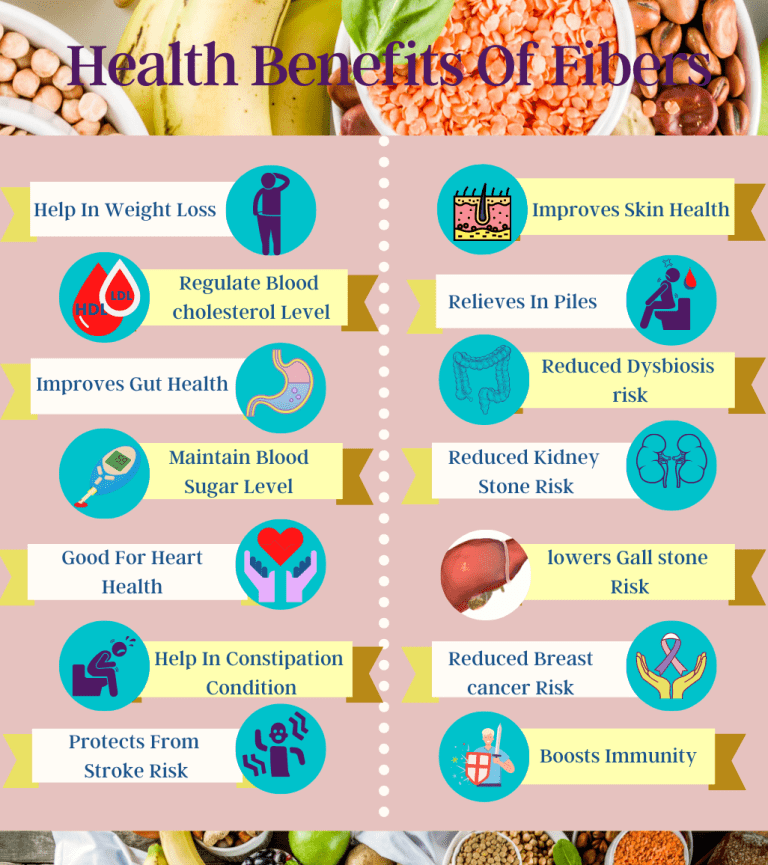
Health Benefits Of Eating Fiber-Rich Food
Prebiotics
- Prebiotics are non-digestible oligosaccharide food ingredients that feed good bacteria present in the gut and prevent dysbiosis.
- Prebiotics found in meager amounts in food.
- All Prebiotics are fiber (soluble fiber) but, not all fiber is considered as prebiotics.
Recognize Health Benefits of Prebiotics
- Dietary Fiber and Prebiotics lower inflammation and reduces symptoms related to bowel disease.
- Reduces diarrhoea and constipation.
- Enhances the absorption of minerals like calcium, magnesium, and iron.
- Provide protection to the colon and reduced the risk of colon cancer.
- Eating the right amount of prebiotics can help to manage weight.
- Boost Bone health.
- Prebiotics protect the mucin layer of the gastrointestinal tract.
- Consumption of the right amount of prebiotics enhances the Immune System.
- It reduces protein fermentation.
- Reduced post-prandial blood sugar concentration.
- It helps to improve immune health, reverses allergies, respiratory disease.
Eating The Right Prebiotic Food Can Help A Lot
- All you need to do is make the correct diet change to enhance the good bacteria in your gut.
- It is vital to choose your food wisely because wrong food can increase harmful bacteria and lead to health complications.
Sources of Dietary Fiber Prebiotics
- FOS and Inulin- are effective prebiotics, they promote the growth of gut microbiota. Helps in improving blood glucose control, increase calcium and magnesium absorption.
- Wood Apple– According to a research from the University of Agricultural Science (Bengaluru) and published in the Indian Journal of science, wood Apple (Bel) is a superfood as it is a fiber prebiotic and rich in calcium, iron, zinc, copper, phosphorus, sodium, potassium, manganese and vitamin C.
Dietary Fiber and Prebiotic Supplements
- It is not possible to meet our daily dietary fiber and prebiotics needs from the food alone. Therefore, it is advisable to have supplements to fulfill daily fiber intake, but it is also equally important to always include any supplements under a good ad experienced health nutritionist. Therefore, some fiber supplements are-is high in soluble fiber, which helps regulate blood sugar and cholesterol level in check.
- Nutra Flora FOS (Fructooligosaccharides) aids the growth of good bacteria like Acidophilus, and Bifidus in the intestine. FOS protects against unhealthy bacteria, lowers cholesterol level, It is a good source of fiber and a noncarcinogenic (not linked to cancer).
- Organic Inulin Prebiotic Pure Powder- This supplement is rich in Inulin prebiotics. Inulin is a FOS (Fructooligosaccharide),harvested from chicory plant roots. Inulin boosts intestinal health. It enhances calcium and magnesium absorption, relieves constipation, reduces blood sugar and fat levels etc.
- Organic Acacia Powder- is sourced from Acacia tree’s extract. Acacia gum is a soluble fiber and improves intestinal regularity. Acacia is also used as a prebiotic and maintain a healthy GIT system. Acacia has many health like it helps in weight management, soothes cough and cold, improves oral health and helps in wound healing.
- Apple Pectin Powder is an insoluble fiber extracted from apples. Apple pectin have many health benefits like, it helps in regulating the cholesterol and blood sugar level. Apple pectin helps in weight loss, enhances iron absorption, relieves constipation, improves acid reflux, good for skin and hair health.
- Psyllium Husk– made from the husk of the “Plantago ovata”s seeds. It is a prebiotic fiber and beneficial for constipation problem, and good for another part of the body as well as it helps control blood sugar and cholesterol level and good for heart health as well.
Conclusion
A gut microbiome influences our overall health, and it becomes essential to take care of our gut microorganisms by feeding good bacteria. Diet without dietary fiber and prebiotics invites a lot of health issues in the long term. Holistic nutrition and a modified diet can change the game in your favor. So it is crucial to choose a food that has a good combination of Fiber, Prebiotic, and Probiotic.

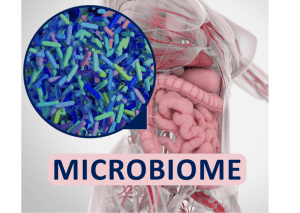
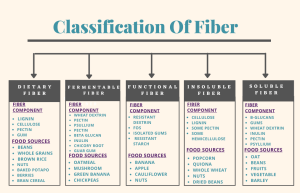
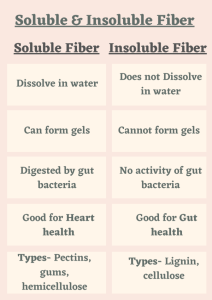
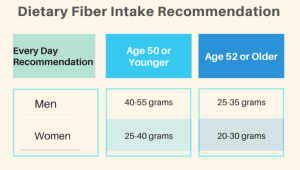
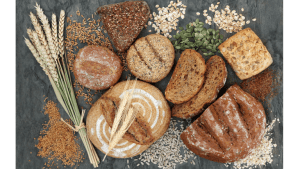
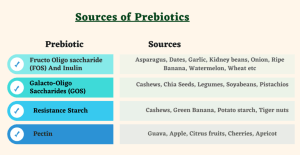

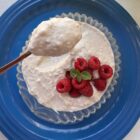
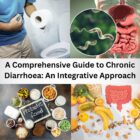

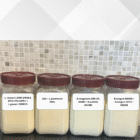



Skin Microbiome: Secret to Radiant Glowing Skin - Wellness By Rosh | Integrative Wellness
23-Dec-21[…] of Prebiotics on Healthy […]
How to Manage Alopecia Areata Naturally? - Wellness By Rosh | Integrative Wellness
17-Feb-22[…] gut microbiome controls our immune system. Probiotics & Fibers may help to treat many autoimmune diseases including alopecia areata. Consuming probiotic […]
Functional Medicine Approach for Tourette Syndrome - Wellness By Rosh | Integrative Wellness
28-Sep-24[…] prebiotics like inulin, fructooligosaccharides (FOS), and galactooligosaccharides (GOS) support the growth of […]